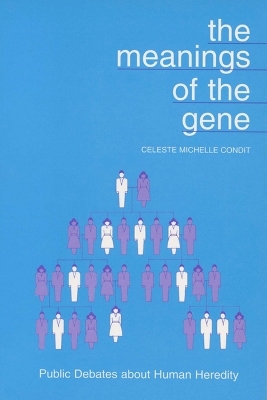
The Meanings of the Gene
Public Debates About Human Heredity
Seiten
1999
University of Wisconsin Press (Verlag)
978-0-299-16364-8 (ISBN)
University of Wisconsin Press (Verlag)
978-0-299-16364-8 (ISBN)
- Titel ist leider vergriffen;
keine Neuauflage - Artikel merken
This text takes a searching look at societal hopes and fears about genetics in the course of the 20th century. In demonstrating the role of rhetoric and ideology in public discussions about this issue, the author asks: who shapes decisions about genetic research - scientists or the public?
This text takes a searching look at societal hopes and fears about genetics in the course of the 20th century. The work of scientists and doctors in advancing genetic research and its applications has been accompanied by plenty of discussion in the popular press - from ""Good Housekeeping"" and ""Forbes"" to ""Ms"" and the ""Congressional Record"" - about such topics as eugenics, sterilization, DNA, genetic counselling, and sex selection. By demonstrating the role of rhetoric and ideology in public discussions about genetics, the author raises the controversial question: who shapes decisions about genetic research and its consequences for humans - scientists, or the public? Analyzing hundreds of stories from American magazines - and, later, television news - from the 1910s to the 1990s, she identifies three central and enduring public worries about genetics: that genes are deterministic arbiters of human fate; that genetics research can be used for discriminatory ends; and that advances in genetics encourage perfectionistic thinking about our children. Other key public concerns highlighted are the complexity of genetic decision-making and potential for invasion of privacy, conflict over the human genetic code and experimentation with DNA, and family genetics and reproductive decisions. The author's analysis reveals a persistent debate in the popular media between themes of genetic determinism (such as eugenics) and more egalitarian views that place genes within the complexity of biological and social life.
This text takes a searching look at societal hopes and fears about genetics in the course of the 20th century. The work of scientists and doctors in advancing genetic research and its applications has been accompanied by plenty of discussion in the popular press - from ""Good Housekeeping"" and ""Forbes"" to ""Ms"" and the ""Congressional Record"" - about such topics as eugenics, sterilization, DNA, genetic counselling, and sex selection. By demonstrating the role of rhetoric and ideology in public discussions about genetics, the author raises the controversial question: who shapes decisions about genetic research and its consequences for humans - scientists, or the public? Analyzing hundreds of stories from American magazines - and, later, television news - from the 1910s to the 1990s, she identifies three central and enduring public worries about genetics: that genes are deterministic arbiters of human fate; that genetics research can be used for discriminatory ends; and that advances in genetics encourage perfectionistic thinking about our children. Other key public concerns highlighted are the complexity of genetic decision-making and potential for invasion of privacy, conflict over the human genetic code and experimentation with DNA, and family genetics and reproductive decisions. The author's analysis reveals a persistent debate in the popular media between themes of genetic determinism (such as eugenics) and more egalitarian views that place genes within the complexity of biological and social life.
Celeste Condit is professor of speech communication at the University of Georgia. She is the author of several books on public discourse and social change, including "Decoding Abortion Rhetoric," "Crafting Equality: America's Anglo-American Word," and "Evaluating Women's Health."
| Erscheint lt. Verlag | 31.10.1999 |
|---|---|
| Reihe/Serie | Rhetoric of the Human Sciences |
| Verlagsort | Wisconsin |
| Sprache | englisch |
| Gewicht | 456 g |
| Themenwelt | Medizin / Pharmazie ► Medizinische Fachgebiete ► Medizinethik |
| Studium ► 2. Studienabschnitt (Klinik) ► Humangenetik | |
| Studium ► Querschnittsbereiche ► Geschichte / Ethik der Medizin | |
| Sozialwissenschaften ► Soziologie | |
| ISBN-10 | 0-299-16364-4 / 0299163644 |
| ISBN-13 | 978-0-299-16364-8 / 9780299163648 |
| Zustand | Neuware |
| Haben Sie eine Frage zum Produkt? |
Mehr entdecken
aus dem Bereich
aus dem Bereich
Eine sehr persönliche Geschichte | Der New York Times-Bestseller
Buch | Softcover (2023)
Ullstein Taschenbuch Verlag
CHF 30,75
Die revolutionäre Medizin von morgen (Lifespan)
Buch | Softcover (2020)
DuMont Buchverlag
CHF 22,40
Buch | Softcover (2022)
John Wiley & Sons Inc (Verlag)
CHF 169,95


